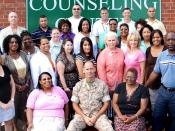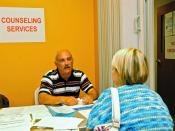As stated in his interview, Larry Crabb maintains that his basis for counseling in community revolves around two questions:
1.What kinds of relationships lead to the growth of people in them?
2.What kinds of relationships lead to the destruction of people in them?
The bottom line is the soul in its relationship to God and to others. So therefore, if there are healthy relationships within the community that can promote the growth of spiritual relationships, counseling in community would be equally as beneficial as clinical counseling.
According to Crabb, there are three characteristics that a counselor should have:
A counselor, whether clinical or community, must be willing to enter the battle to the point that they are entirely dependent on God beyond the limits of a theory.
A counselor must be able to have a vision of the potential of what God COULD do in a person's life, and be able to recognize the obstacles between here and there.
A counselor must emanate the energy of Christ paralleling the work of Christ Himself.
None of these necessary characteristics are restricted to a clinical counseling setting alone, therefore if counseling and caring can be taken on by the community, the support and effects would snowball because of the larger support network. Connecting and networking is crucial for church health. Although the individual counselor is a critical part, it is only a segment; counseling is a community event.
As the principle of counseling in community upholds, counseling is a form of stewardship: stewardship is a relationship, and not an action or activity. A community or person(s) in community that can be a healthy steward is one that goes to the work of understanding the influential components that make up the whole. Co-pilgrimage is entering into the story of another person's...


